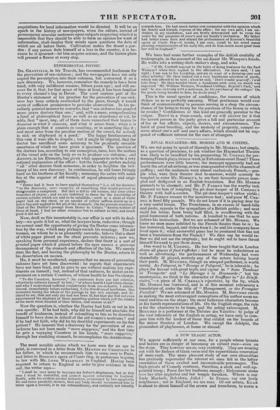EXPERIMENTAL PHYSIC.
DR. GRANVILLE, in his Travels, has recommended laudanum for the prevention of sea-sickness ; and the newspapers have not only copied the prescription into their columns, but canvassed it as a new discovery. We, however, remember the remedy to have been tried, with very indifferent success, fifteen years ago ; and will an- swer for it, that, for that space of time at least, it has been familiar to every chemist's boy in Dover. The most curious part of the Doctor's statement of his practice for the prevention of sea-sick- ness has been entirely overlooked by the press, though it would seem of sufficient prominence to provoke observation. In his pe- culiarly pointed manner he remarks, that "sea-sickness has puzzled more -grave doctors than one ;" and, with a sneer, comprehending a fund of philosophical force as well as an abundance of wit, he adds, that " most, nay, all of them have ransacked their brains to discover in what it consists, and what it arises from ; when it is plain enough that it consists in vomiting, or in something like it ; and must arise from the peculiar motion of the vessel, for nobody is sick on shipboard in a pond." The happy facetiousness of this vein it were idle to dispute ; but it might be objected, that the doctor has sacrificed some accuracy to the peculiarly enviable smartness of which we have given a specimen. The question of the doctors has, according to our conception, been, how the motion of the vessel acts on the body so as to produce sea-sickness ; and ARNOTT, in his Elements, has given what appears to us to be a very rational explanation of the effect : but the traveller prefers making " all" other doctors think nonsense, in order to heighten the bril- liancy of his own discovery. In continuation, he still bears bitingly hard on his brethren of the faculty ; seasoning the satire with some fun at the expense of old women, of equal pleasantry and origi- nality. " Better had it been to have applied themselves" (i. e. all the doctors) " to the discovery, more empyrico, of something that would prevent so disagreeable a complaint. But this is left to old women, like some other branches of physic ; and we are Indebted to them for the knowledge of certain articles which are said to be infallible,—such as a sheet of white paper laid on the chest, or an amulet of yellow saffron sewed up in a green bag and applied to the pit of the stomach. On the present occasion," (that of the Doctor's passage from Dover to Calais) " having neither of these at hand, I had no other resource but to submit to fate, and much good it did me."
Now, droll as this incontestably is, our affair is not with its drol- lery—we quote itbut as, what the lawyers term, induction; though we cannot omit the opportunity of giving the Doctor some informa- tion by the way, which may perhaps enrich his nosology. The old women, on whom he is so pleasantly sarcastic, believe that a sheet of white paper placed on the chest prevents sickness ; now we, speaking from personal experience, declare that there is a sort of printed paper which if placed before the eyes causes a grievous derangement of the stomach and affection of the bile. We merely state the fact, and leaving the philosophy to the Doctor, return to his dissertation on nausea.
He, it must be recollected, supposes that no means of preventing sickness have yet been discovered : he regrets that experiments have not been tried, and he goes to sea without making any expe- riments on himself ; but, instead of that rashness, he makes an ex- periment on a certain Countess, of whose health he has the charge.
"To the Countess, however," (he continues from our last citation, wherein he submits himself to fate,) "of whose health I had taken charge, and who I understood suffered considerably from sea-sickness, I admin- istered, immediately before embarking, forty-five drops of laudanum. She remained during the whole of the passage in her own carriage, and de- dared to me, that not only she had not been ill, but that she had not even experienced the slightest of those appalling qualms which rob the cheeks of the most stout-hearted of their bloom, and unman us all."
Now the question is, whether the Doctor had faith or not in his own specific. If he had faith, why did he himself not also take the benefit of laudanum, instead of submitting to fate as he describes himself to have done in default of the old women's nostrums ? and if he had not faith, why did he try doubtful experiments on his fair patient ? He laments that a discovery for the prevention of sea- sickness has not been made "more empyrico," and the first time he gets a voyaging Countess in his hands, "more empyrico," through her confiding stomach, he accomplishes the desideratum.


















 Previous page
Previous page